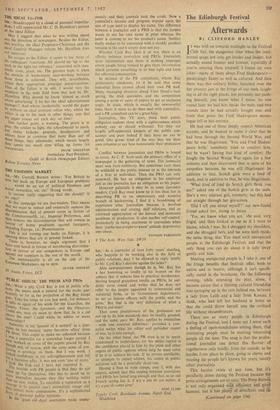'PUBLIC ODIUM,' THE PRESS AND PROs
SIR,`-What a pity Cyril Ray is not in public rela- tions. He seems such a natural for the trade, par- ticularly so far as the projection of the Ray image f°es. Take his letter to you last week, for instance.t s tells us again of his work for the Guardian, the ,,,tenday Times, the Spectator, and the Observer. ajould - anY Man do more to show that he is a cut °°ve the rest? Could white be whiter or more immaculate? Naturally in his 'quarter of a century' as a jour- oast he has resisted 'many lucrative offers' from kiifirms. This ought to make me ashamed because ev11as a journalist for a somewhat longer period. I thr worked on some of the papers graced by Ray ferur11.gh not, of course, with the same sense of con- tact:11g a privilege on them. But I was weak. I fOr'confidence in my self-righteousness and fell / a lucrative offer. It was not even 'one of many.' ../?,..ok the first and I have not regretted it. stan",e trouble with PR people is that they do not so up for themselves. One has to stand up to tha: journalists because they like nothing better seoRii an easy victim. To establish a reputation as a th is to project one's journalistic image and fors attract more commissions. It's a sophisticated ilr:o1 personal public relations. theof 'good old days' journalists wrote anony- mously and their journals took the credit. Now a journalist's income and progress depend upon the size of type used to display his name. The difference between a journalist and a PRO is that the former wants to see his own name in print whereas the latter is content to see his product's name. Neither really wishes to be associated with a shoddy product because in the end it simply does not pay.
Whether Cyril Ray likes it or not, there is an affinity between journalists and PROs. Journalists want information and there is nothing improper about people being trained to give them information which presents something in its best light and form for editorial consumption.
In defence of the PR consultants, whom Ray particularly condemns, let it be said that some industrial firms cannot afford their own PR staff. Many managing directors dread Fleet Street's bad- gering, the trick questions, and the competition among a score or more of papers to get an exclusive angle. In crisis, which is usually the newsworthy time, there is more to do than deal with journalists, and a PR consultant can be a great help.
Journalists, like TV stars, think their public obligation endows them with a righteousness which nobody can or should withstand. Yet they are largely self-appointed keepers of the public con- science and pure indeed if they have no axe to grind. One grows tired of the way they use their own columns to say how honourable their profession is Conflict between journalists and PROs is bound to occur. As C. P. Scott said, the primary office of a newspaper is the gathering of news. The journalist must seek facts ruthlessly. But sometimes facts must be withheld in the public interest or in the interests of a firm or individual. Then the PRO can only stonewall. He has an obligation to his employer just as the journalist has an obligation to his paper.
However palatable it may be to some Spectator readers, Cyril Ray must know he is less than fair in describing PR as an unnecessary and wasteful branch of huckstering. I find it a broadening of experience after journalism because it involves administration and costing, staff relations, and an informed appreciation of the human and economic problems of production. It also teaches self-control, particularly in being courteous to journalists when their 'public-has-a-right-to-know' attitude degenerates into abuse.


































 Previous page
Previous page